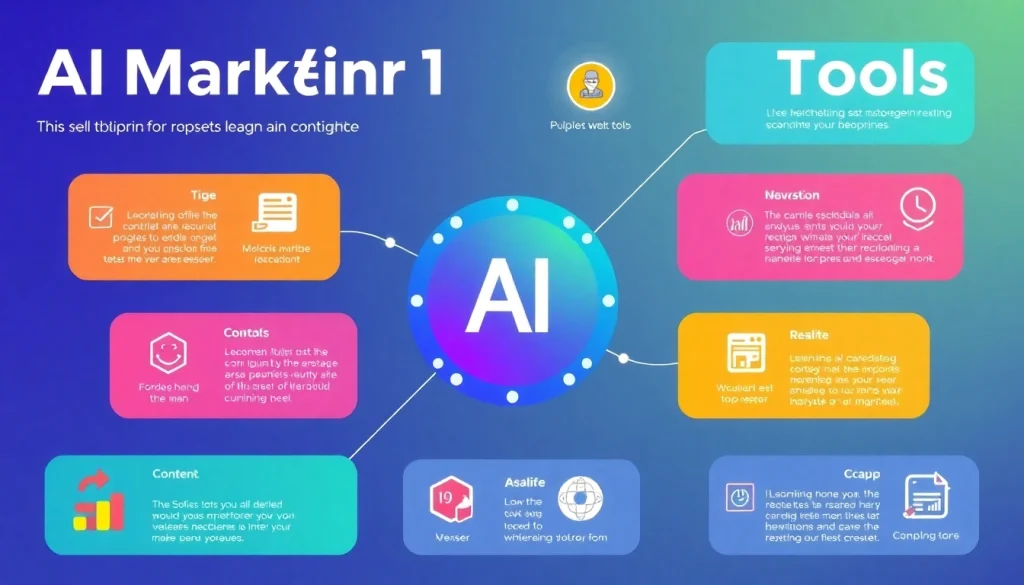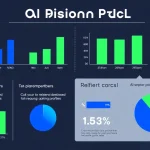Introduction to AI Marketing Tools
In today’s rapidly evolving digital landscape, businesses are increasingly turning to AI marketing tools to drive their growth and streamline their operations. These cutting-edge technologies not only enhance marketing strategies but also revolutionize how businesses interact with customers and make data-driven decisions. This article dives deep into the world of AI marketing tools, exploring what they are, their benefits, key features, the best tools available, best practices for implementation, and the future of AI in marketing.
What Are AI Marketing Tools?
AI marketing tools are software applications that utilize artificial intelligence to optimize various aspects of marketing. From data analysis to customer engagement, these tools leverage algorithms and machine learning to automate tasks, provide insights, and enhance the overall marketing experience. They incorporate technologies such as natural language processing (NLP), predictive analytics, and machine learning to tailor marketing efforts based on consumer behavior data.
Benefits of Utilizing AI in Marketing
The integration of AI into marketing provides numerous advantages:
- Increased Efficiency: Automation eliminates repetitive tasks, allowing teams to focus on strategic initiatives rather than manual processes.
- Enhanced Personalization: AI tools analyze consumer data to create personalized marketing messages, boosting engagement and conversion rates.
- Data-Driven Decisions: With the ability to analyze large datasets, AI tools empower marketers to make informed decisions quickly.
- Cost Savings: By automating tasks and optimizing processes, businesses can reduce operational costs.
How AI Marketing Tools Enhance Decision-Making
AI marketing tools provide marketers with actionable insights derived from real-time data analysis. They enable businesses to:
- Identify trends and customer preferences, allowing for better product offerings.
- Segment audiences more accurately for targeted campaigns.
- Predict outcomes of marketing strategies based on historical data.
Key Features of AI Marketing Tools
Automation and Efficiency Boosting
One of the standout features of AI marketing tools is automation. Tasks such as email marketing, social media posting, and ad placement can be automated, significantly reducing the workload on marketing teams. Tools like HubSpot and Mailchimp use AI to send personalized emails at optimal times for each recipient, leading to enhanced open and click-through rates.
Data Analytics and Customer Insights
Data analytics is at the heart of effective marketing. AI tools analyze customer interactions across multiple channels, providing insights into behavior patterns, preferences, and expectations. Platforms like Google Analytics and SEMrush offer advanced analytics that informs strategic decisions, future campaigns, and product developments.
Personalization Strategies Using AI
The personalization of marketing campaigns is crucial for engagement. AI tools enable marketers to create personalized content based on user behavior, demographics, and purchasing history. For instance, Netflix uses AI to recommend shows based on user preferences, significantly increasing viewer engagement.
Top AI Marketing Tools for 2025
Social Media Management Tools
Social media presence is pivotal for businesses today. Here are some top AI tools for managing social media:
- Buffer: Uses AI to tailor posts specifically for each social media channel, ensuring optimal engagement.
- FeedHive: Helps with content recycling and conditional posting, optimizing what to post and when.
- Hootsuite: Offers AI-driven insights into follower engagement and content performance.
Content Creation Tools
Content is king. AI tools can assist in creating, optimizing, and distributing quality content. Notable tools include:
- Jasper: A content generation AI that helps writers produce blog posts, articles, and marketing copy effectively.
- Surfer SEO: An AI tool that optimizes written content based on real-time data from search engines, ensuring better visibility.
- Copy.ai: A powerful tool for generating ad copy, social media posts, and blog content.
Advanced CRM Solutions
Customer Relationship Management (CRM) has evolved with AI integration. Top-performing CRM tools include:
- Salesforce: Employs AI capabilities to personalize customer interactions and streamline communication.
- HubSpot: Features AI-driven insights into customer behavior, enhancing relationship-building efforts.
- Zoho CRM: Offers AI-powered sales predictions and customer insights.
Best Practices for Implementing AI Marketing Tools
Choosing the Right Tools for Your Business
Not all AI marketing tools will suit your business needs. It’s crucial to evaluate tools based on:
- Your marketing objectives and strategies.
- User-friendliness and support.
- Integration capabilities with existing systems.
Measuring Success with AI
Implementing AI tools should translate to measurable results. Key performance indicators (KPIs) include:
- Conversion rates
- Customer engagement and satisfaction scores
- Return on investment (ROI)
Common Pitfalls and How to Avoid Them
While AI marketing tools offer tremendous benefits, some common pitfalls can hinder effectiveness:
- Neglecting Data Quality: Poor quality data can lead to ineffective outcomes. Regular audits and updates are vital.
- Over-Automation: Striking a balance between automation and personal interaction is crucial for customer relationships.
- Ignoring Insights: Implementing AI tools without acting on the insights gathered can lead to stagnation.
The Future of AI in Marketing
Trends Shaping AI Marketing Tools
As technology advances, several trends are shaping the future of AI marketing tools:
- Voice Search Optimization: With the rise of voice-activated devices, optimizing marketing content for voice search is essential.
- Increased Personalization: AI will further evolve to create hyper-personalized experiences based on deeper consumer insights.
- AI-Powered Chatbots: Chatbots will become more sophisticated, handling customer inquiries with greater accuracy and empathy.
Integrating AI with Existing Systems
For maximum effectiveness, integrating AI tools with current marketing systems is critical. This involves:
- Assessing compatibility
- Ensuring seamless data flow between systems
- Training team members to utilize AI tools effectively
Preparing for Upcoming Innovations
The continuous evolution of AI means marketers must stay ahead of trends by:
- Regularly educating themselves on new technologies
- Experimenting with emerging tools and techniques
- Collecting feedback to adapt and optimize strategies



